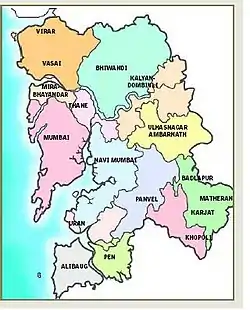Mumbai Metropolitan Region
Mumbai Metropolitan Region (abbreviated to MMR and previously also known as Greater Bombay Metropolitan Area),[1][2] is a metropolitan area consisting of Mumbai and its satellite towns in the northern Konkan division of Maharashtra in western India. The region has an area of 6,328 square kilometres (2,443 sq mi)[3] and with a population of over 26 million it is among the most populous metropolitan areas in the world.[4]
Mumbai Metropolitan Region
Greater Mumbai (MMR) | |
|---|---|
| |
 Map showing the extent of MMR with its municipal corporations and councils | |
| Country | |
| State | Maharashtra |
| Core city | Mumbai |
| Districts | Mumbai City Mumbai Suburban Thane Palghar Raigad |
| Area | |
| • Metro | 6,328 km2 (2,443 sq mi) |
| Population (2016 Census) | 22,885,000 |
| • Density | 4,764/km2 (12,340/sq mi) |
| Time zone | UTC+5.30 (IST) |
| PINs | 400 001 to 421 605 |
| GMP | US$ 400 billion |
| Website | www |

Developing over a period of about 20 years, it consists of nine municipal corporations and eight smaller municipal councils. The entire area is overseen by the Mumbai Metropolitan Region Development Authority (MMRDA), a state-owned organisation in charge of town planning, development, transportation and housing in the region.
The MMRDA was formed to address the challenges in planning and development of integrated infrastructure for the metropolitan region.The areas outside Brihanmumbai (Greater Mumbai) and Navi Mumbai have lacked organised development. Navi Mumbai, developed as one of the largest planned cities in the world, was promoted by a state government-owned company, City and Industrial Development Corporation (CIDCO).
The region has had problems related to haphazard and illegal development as a result of rapid urbanisation. Villages along the NH 3 in Bhiwandi are examples of haphazard developments in the MMR, with some of the largest warehousing areas in India. Government agencies such as the Town Planner and Collector of Thane have had challenges in addressing unorganised development.
Municipal Corporations
Districts
- Mumbai City (complete)[6]
- Mumbai Suburban (complete)
- Thane (partial)
- Raigad (partial)
- Palghar (partial)
See also
References
- Segbers, Klaus; Raiser, Simon; Segbers; Volkmann, Krister (2007). The Making of Global City Regions: Johannesburg, Mumbai/Bombay, São Paulo, and Shanghai. ISBN 9780801885150.
- Verma, Harnam Singh (1985). "Bombay, New Bombay, and Metropolitan Region: Growth Process and Planning Lessons".
- "Metropolitan region now covers Palghar, Vasai | Mumbai News - Times of India". The Times of India.
- "INDIA STATS: Million plus cities in India as per Census 2011". Press Information Bureau, Mumbai. National Informatics Centre (NIC). Archived from the original on 30 June 2015. Retrieved 7 February 2012.
- "Mumbai Metropolitan Region Development Authority – About MMR". mmrda.maharashtra.gov.in. Retrieved 21 February 2017.
- "Mumbai metropolitan area" (in Italian). Projectsecoa.eu. Archived from the original on 6 October 2014. Retrieved 14 March 2013.


.jpg.webp)

.jpg.webp)

